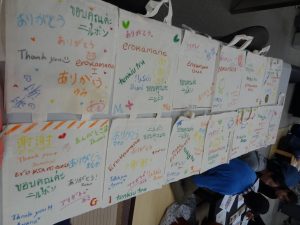2017年10月28日(土)の午後、ジュニアキャンパスの一環として、中学生向けゼミを開催しました。参加してくれた10人の中学生と、約10人の京都大学学生・院生が、環境問題と国連SDGsについて学び、「私は何ができる?」をテーマに議論の後、マイバッグをデザインしました。

≪参加(運営支援)してくれた院生からのレポート(抜粋)≫

Javen Evera, Master student of Kyoto Univ. Graduate School of Global Environmental Studies
1.Overview
Learning and adapting to sustainable living to enjoy life is the foremost expectation by every individual in life here on this earth. People want to live a harmonious living with everything around them and easy to access to sustain life continuously but again if we all are not careful with our usage of such essentials of life (everything around us), it can be disastrous in future and eventually makes life miserable.
Therefore, it such importance to educate our young generations on the outcome/effect of such overuse and unwise use of environment and its resources which may be have tremendous (disastrous) effect to our expectation of harmonious /sustainable living in future.
As promoting such efforts, Kyoto University plays active role in educating students to become better users of environment resources to achieve sustainable living in future. Moreover, on the 28th October 2017, a similar environment educational awareness activity was conducted under supervision of Professor Asari.
Participants:
・10 Junior High School Students from Kyoto City
・Professor Asari
・7 Kyoto University Students from Professor Asari Class/Lab
Venue:
・ Professor Asari Laboratory, Kyoto University (main Campus), Room 709,
・ 7F, Faculty of Engineering Science Dept. Bldg.
2.Objective (s)
The objective of this activity is to;
a) Understand younger student generation’s views on uprising environmental problems
b) Measures to undertake to address these problems for sustainable living in future
c) Participate in group discussing and further design these approaches on the one side of the eco-bag and with word ‘thank you’ on the other side of this eco bag in many different languages of the participants.
3.Achievements from the events (Outcome)
A total of ten (10) Students from a Junior High School were given the opportunity to express their views about uprising environmental issues and how they want to address these issues to achieve sustainable living. It is understood and noted that these junior high students are very optimistic about these issues and how they could address them. They even expressed freely about what they think of future living and how life is expected in the next 50 -70 years when they are senior in terms of sustainable living.
Here are some responses from junior high students when asked about what they think about sustainable living in future and about society in 50-70 years later;
・One student said that, ‘she wanted to ride and use a car without driver’.
・The other student said that she expects that in future we should do away with gasoline and use solar energy for vehicles or other machineries/ equipment’s. This is basically to combat environment pollution, etc.
・The other student expressed that she wanted to live happily with everything that makes life easier and comfortable for her to use and have access in future.
Each student had drawn their views of sustainable living with designs on the eco-bag. Through this activity, each student expressed his or her views on the bag design with different coloured scenery drawn pictures of sustainable living, environmental friendly, nature preservation, 3 R’s, eco-energy uses, etc.
This outcome is to show how much they understand about sustainable living through environmental management to meet Sustainable Development Goals (SGD). It helps our young generation to have positive thinking towards environment uses. These designs/pictures indicate what every individual student expects to do to achieve sustainable living in future. Their action today can achieve some of SDG objectives in future.
4.Recommendation
Such educational activities are proactive approach to teach young minds to develop and act responsibly for everything around them (nature, environment, infrastructure, equipment, technology, etc.) for sustainable future living.




